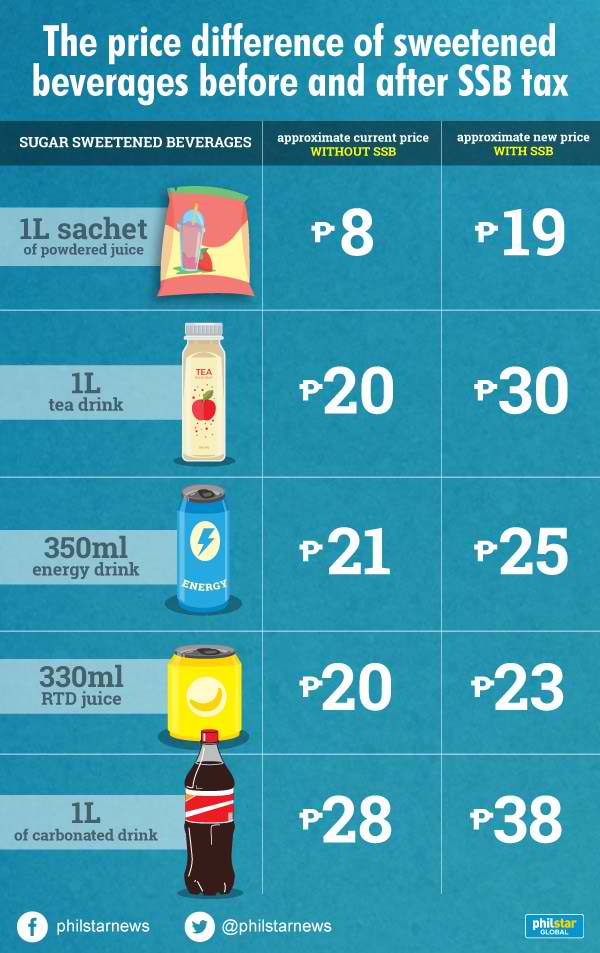Sweetest compromise: Cutting sweetened beverage taxes and its consequences
November 20, 2017
(Originally published on November 17 by Philippine Star)
On Nov. 7, 2017, Sen. JV Ejercito, in a letter addressed to the Chairman of the Committee of Ways and Means Senator Sonny Angara, proposed amendments to Senate Bill 1592, otherwise known as the Tax Reform for Acceleration and Inclusion (TRAIN). The amendments for approval and consideration of the Committee cover provisions related to income tax, housing VAT exemption, sugar sweetened beverage tax and tobacco tax.
Of particular importance to consumer interest is the sugar sweetened beverage (SSB) tax, more popularly known as the “anti-poor” provision of the tax reform package.
These are the “Ejercito Amendments” on the SSB tax:
a) tax of three centavos (P0.03) per gram of sugar on sweetened beverages using purely caloric sweeteners except for those using purely coconut sap sugar;
b) tax of five centavos (P0.05) per gram of sugar on sweetened beverages using purely high fructose corn syrup or in combination with any caloric or non-caloric sweetener; and
c) tax of one centavo (P0.01) per gram of sugar on sweetened beverages using purely non-caloric sweeteners or a mix of caloric and non-caloric sweeteners except for those using purely steviol glycosides.
Tax cut: Sweetest compromise for all
Lowering the excise tax rates for sugar sweetened beverages is the best and sweetest compromise for consumers, stakeholders and the government.
One of the primordial rights of consumers is the satisfaction of basic needs. This guarantees that consumers can avail of basic commodities at affordable prices.
This proposed tax measure is crucial to the fate of millions of low-income Filipino consumers, who drink energy drinks, sweetened water and tea, powdered juice drinks, carbonated beverages and fruit refreshments every day. Higher prices will adversely affect the day-to-day living expenses of an ordinary Juan De La Cruz as once low-cost products will have become suddenly unaffordable.
Consumers stand to reap higher benefits from the tax cut. In lieu of the approved House Bill No. 5636 excise tax rate of P10 per liter for drinks containing purely locally produced sugar and P20 on beverages with imported sugar or sweeteners, the reduced rates, as provided in the aforementioned amendments, will have a much lower impact on prices.

While the imposition of lower taxes is favorable for Filipino consumers and stakeholders, the government will not be placed at a disadvantage as its intended tax reform package will not be put to a halt. This creates a win-win solution because the government will still be able to generate tax revenues to finance its programs.
Socio-economic considerations justify the tax cut
The overarching socio-economic considerations outweigh the rationale of the SSB tax to promote a healthy lifestyle for Filipinos by curbing incidents of obesity and diabetes.
First, lack of healthy food access and undernutrition disproportionally impact low-income populations. Data from the 2017 State of Food Security and Nutrition in the World by the Food and Agriculture Organization of the United Nations illustrate that the main health concern of the Philippine is undernutrition, not obesity. The prevalence of undernutrition in the total population, at 13.8 percent, is significantly higher than the prevalence of overweight in children (under 5 years of age) at 5 percent and the prevalence of obesity in the adult population (over 18 years of age) at 5.2 percent.
Second, the economic impact of these increased taxes will hurt the parts of the society that need the most protecting. Community and micro-entrepreneurs, such as sari-sari store owners, together with their customers, as well as minimum wage earners and blue-collar workers, will suffer the blow of this tax measure. According to the recent statement of Philippine Association of Stores and Carinderia Owners (PASCO), the SSB tax will likely result in the loss of 40 to 50 percent of the total income of 1.3 million sari-sari store owners from the prospective reduced sales of sugar sweetened beverages, such as three-in-one coffee, powdered and liquid juice drinks, soft drinks and ready-to-drink teas.
Further, we should not discount the possible shrinkage of the manufacturing and local sugar industries, as the high tax rate, if implemented, is expected to result in many job losses. In view of higher taxes, the lower demand for raw sugar will mean a stagnant supply of sugar-related products and byproducts. Businesses across the entire beverage supply chain will be affected-from local sugar farmers to food and beverage manufacturers, convenience stores and the restaurant trade.
Narrow focus on taxation not enough to address the real issues
Although a narrow focus on quick tax solutions may mean higher tallies of political points, this tax program will not address our country’s most important public health and development goals.
If indeed the government wants to pursue its health initiative by reducing the cases of obesity and diabetes, it must first address the very real concerns of improving access to healthy foods, incentivizing manufacturers to sell healthy products and promoting healthier lifestyle changes through education. Taxing sugary drinks may make fruits and vegetables relatively cheaper, but it does not make them more affordable for the everyday Juan.
Rather than pursuing a quick fix solution of passing the increased cost and burden to consumers, a reassessment of the proposed legislative measure is needed to focus on the pressing issues of undernutrition.
The reduction of sugar beverage tax is the best and sweetest compromise that is available on the table to ensure that higher benefits are accorded to our Filipino consumers.
— Graphics by RP Ocampo
